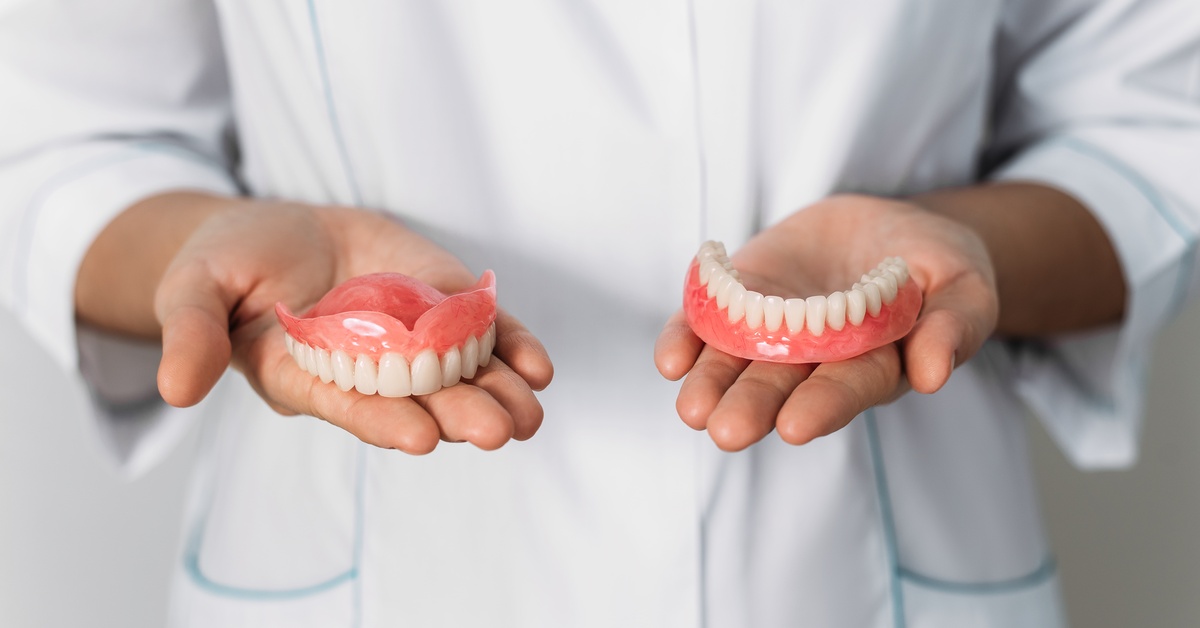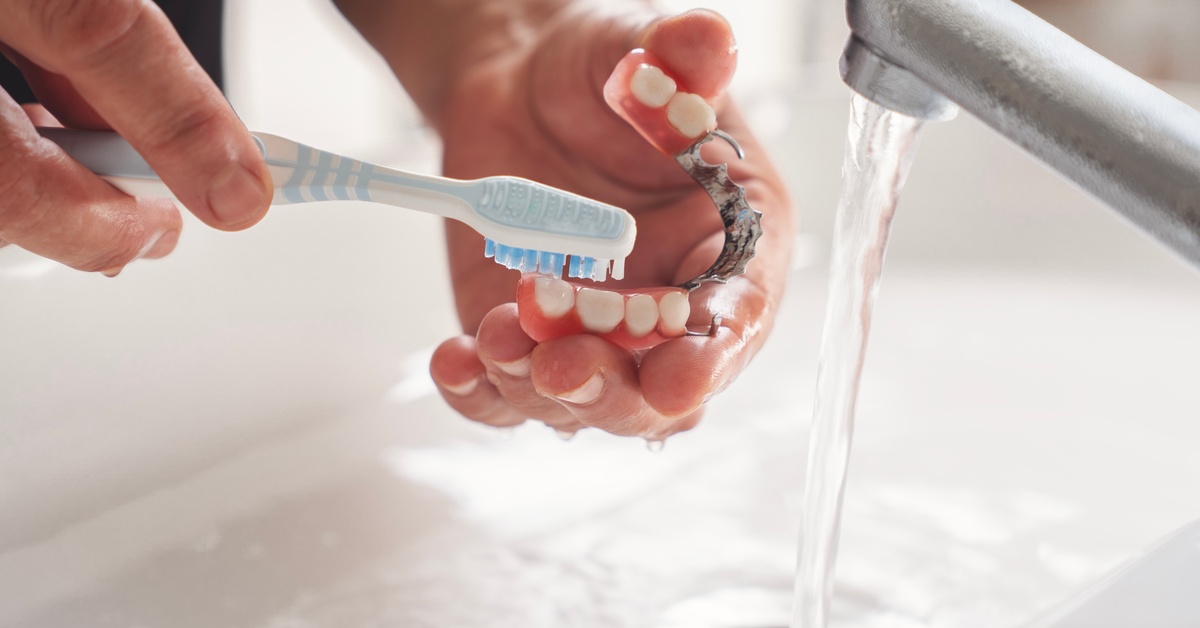
Getting dentures is a significant step toward reclaiming your smile and improving your quality of life. If you’re exploring your options, you’ve likely come across traditional and implant-supported dentures. Both serve the purpose of replacing missing teeth, but they offer different experiences in terms of stability, comfort, and long-term oral health.
Choosing the right type of denture can affect your daily activities, from eating your favorite foods to speaking with confidence. We believe that a well-informed patient is an empowered patient. Let’s explore the differences between implant-supported and traditional dentures to help you determine which path might be right for your smile journey.
What Are Traditional Dentures?
Traditional dentures, also known as conventional dentures, are removable oral appliances designed to replace a full arch of missing teeth. They consist of a gum-colored acrylic base that fits over your gums and artificial teeth that restore your smile’s appearance. The upper denture covers the roof of your mouth (palate), while the lower denture is horseshoe-shaped to accommodate your tongue. They rely on suction from a thin layer of saliva as well as a thick ridge of jawbone to stay in place and are sometimes supplemented with dental adhesive for extra security.
How Do Traditional Dentures Work?
Traditional dentures work by creating a seal with the gums and fitting over the bony ridge of your jawbones. Your provider will take an impression (a negative mold) of your mouth to create a custom-fit denture. The upper denture gets its stability from the suction created against the roof of the mouth and how much jaw bone the denture fits over. The lower denture, with less surface area to grip, relies more on the support of your cheek muscles and tongue to stay in position. However, the tongue and cheek can also dislodge the lower denture, which can lead to trouble with it staying in place. Many wearers use dental adhesive to reduce movement of their dentures while they’re eating or speaking.
What Are Implant-Supported Dentures?
Implant-supported dentures offer a more modern and stable solution. Instead of relying solely on the gums and bone, these dentures attach to dental implants, which are small titanium posts that are surgically placed into the jawbone. These implants act as artificial tooth roots, providing a solid foundation for the denture to snap onto. This connection prevents the denture from shifting or slipping, offering far greater stability and retention than their traditional counterparts.
How Do Implant-Supported Dentures Work?
To get implant-supported dentures, your dentist or a dental specialist will first place several dental implants into your jawbone. After a healing period, during which the implants fuse with the bone, your provider will attach abutments to the implants. Abutments connect to the denture. Your custom-made denture will have special attachments on its underside that securely snap onto the abutments, locking it firmly in place.

Comparing Retention and Fit
The most significant difference between the two options is retention. Traditional dentures can shift, slip, or even fall out, especially when you’re eating chewy foods or speaking energetically. This instability can be a source of embarrassment and discomfort. Lower dentures are particularly prone to dislodging during chewing or speaking.
Implant-supported dentures, on the other hand, are anchored directly to your jawbone via the snapping mechanism between the implants and denture. This provides exceptional stability and retention by eliminating any movement. You can eat, speak, and laugh confidently because you know your dentures will stay put. Implant-supported dentures are the standard of care for lower dentures.
Impact on Chewing and Diet
Denture stability directly affects your ability to chew. People wearing traditional dentures often have to avoid hard, sticky, or chewy foods because the force of chewing can dislodge the appliance. This can lead to dietary restrictions and make it difficult to enjoy a varied, nutritious diet.
Implant-supported dentures restore a much greater degree of chewing power, almost at the level of natural teeth. They are anchored to the jawbone, so you can confidently bite into an apple or enjoy a steak without worrying about your dentures moving.
Effects on Jawbone Health
When you lose teeth, the jawbone no longer receives the stimulation it needs from tooth roots, causing it to deteriorate over time. Traditional dentures rest on top of the gums and do not provide this necessary stimulation, so bone loss continues. This is why you must often reline or replace traditional dentures as the shape of your jaw changes.
Dental implants mimic the function of natural tooth roots, stimulating the jawbone and reducing bone loss in the area around the implants. Implants can offset the loss of retention for dentures that rest on a bony ridge that has lost a lot of volume over time. This long-term benefit is a major consideration for patients interested in dental implants in Albany.
Speech and Confidence Differences
Unstable dentures can affect your speech, causing slurring or clicking sounds as they move in your mouth. Many wearers feel self-conscious and may even avoid social situations.
Because implant-supported dentures are secure, they allow for clear, natural speech. The upper implant denture also doesn’t cover the palate, which can improve taste and make speaking feel more natural. This boost in confidence is often life changing for patients.

Daily Care and Maintenance
Both types of dentures require daily cleaning, but the routines differ slightly. You must remove traditional dentures every night for cleaning and to give your gums a rest. You will need to brush them thoroughly and soak them overnight in a special solution.
Some implant-supported dentures are removable for easy cleaning, but others are fixed and can only be removed by a dentist. You can clean the removable types as you would traditional dentures or clean around the implants in your mouth.
Considering the Cost
Initially, traditional dentures are more affordable. However, it’s important to consider long-term costs. Traditional dentures may need frequent adjustments, relining, and replacement every 5 to 10 years due to changes in your jawbone. You will also face ongoing costs for adhesives.
Implant-supported dentures have a higher upfront investment due to the surgical placement of the implants. However, they can be more cost-effective over time because they preserve the jawbone and typically last much longer with proper care. Additionally, with your ability to maintain a better diet due to increased chewing capacity, your overall health may improve with implant-supported dentures compared to traditional dentures. Comparing the differences between implant-supported and traditional dentures with your dentist can clarify the long-term value.
The Right Choice for Your Smile
Choosing between implant-supported and traditional dentures is a personal decision that depends on your health, budget, and lifestyle. Traditional dentures have been reliable solutions for many years, but implant-supported dentures offer significant advantages in stability, function, and long-term oral health.
Schedule a consultation with our team to discuss your options. We can evaluate your situation and help you determine which solution will give you the confident, comfortable, beautiful smile you deserve.
